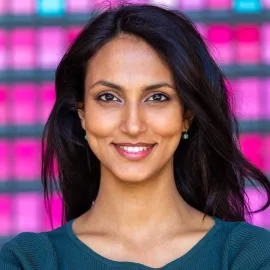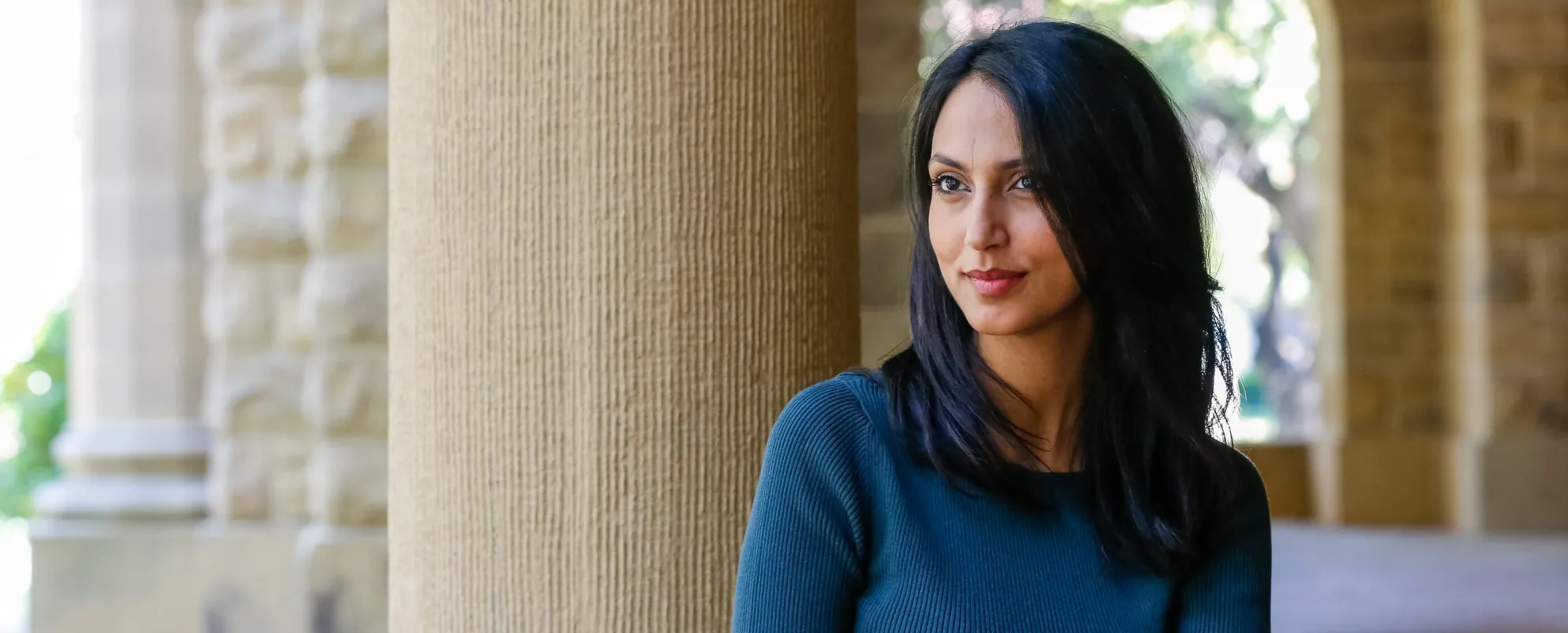At 29, Sophia Shramko’s life story already is cinematic in both scope and drama.
Born into a nomadic Arab family, she grew up a social outcast in Israel as the fifth of nine children born to a mother who fled an oppressive marriage and conservative culture. At 14, she was discovered by a fashion photographer and signed to the prestigious Elite modeling agency, eventually becoming the face of the Diesel brand in Israel.
But Shramko walked away from life as a model to pursue the educational opportunities so prized by her mother. Despite being diagnosed with multiple sclerosis at 19, she earned her undergraduate degree in electrical engineering at Tel Aviv University and worked at Intel before landing at Stanford GSB in 2017. She interned at Google, but chose to delay the finale of her MBA experience until December, because her planned June graduation coincided with the due date of her first child, a boy.
You’ve described being born to a reality you couldn’t change, but deciding you could still change your future. Was there a single moment that convinced you of that?
Not a single moment, but a series of moments. My mom was a single mom. She wasn’t allowed to go to school. Her parents didn’t think women should get an education. So she raised us by herself, and my father didn’t recognize us as his children. In the Jewish town where we lived, people didn’t accept us because we were the only Arab family living among Jews. We had nothing. No money. No social status. But every morning when she woke us up, she told us that education was our weapon. She was always cheerful and encouraged us to wake up with a lot of energy. And because she kept telling us this, we learned the future was in our hands.
It apparently worked with you. What about your siblings?
All my siblings pursued education. One sister is a midwife and lecturer at Tel Aviv University. One brother is a CPA, a supervisor with the Israel Tax Authority, and sits on the board of Israel Diamond Institute, and another is getting his engineering degree. Another sister is vice president of a school, working in education. Another is a nurse. Another is an officer in the Israel Defense Forces who studied law in the Hebrew University of Jerusalem. Another is still deciding what to study, and another is still in high school. My mom, she’s an amazing woman.
Did you learn any leadership lessons from your mother that help you today?
How important it is to inspire your people to go and do the impossible. That’s what she did with her children. From nothing, we were raised to be educated people. She was so inspiring to us. And resilient. When we were confronted with racism in our neighborhood, she just showed them she could be a good neighbor. Now everyone knows my mom and likes her. She fought hatred with love.
Having realized you could choose your destiny rather than accept your reality, what are some of the ways you exercise that freedom of choice in your daily life?
I apply that every time I have a hard decision. That’s when that idea comes up. I’ve thought about that many times with my disease. Life is uncertain with MS, and it’s easy to be depressed, because I may someday live with a disability. And in the first year after giving birth, the chance of an attack increases by 30%. How can I take care of a child? But instead of thinking about all the bad things in life, I choose to focus on the good things. I’m trying to be present in the moment. I meditate for two hours every day. I try to approach things objectively, to think about what I can do to change the situation I’m in.
For example?
I wanted to study engineering and work in the Israel Defense Forces. Everyone told me it was impossible. I’m an Arab. They don’t let people like me do research and development in the IDF. But I kept working my way up the chain of command until I reached the chief of staff, and he gave me permission to become the first Arab woman involved in R&D.
Did you serve?
I enrolled in the student-soldier program, did basic training, then went to study engineering at the university for four years. In my second year I was diagnosed with MS and dismissed. My choice was to fight the IDF about my dismissal or fight for my health. I decided to focus on my health. Freedom to choose means you have to choose your battles.
How were you discovered by a modeling agency?
I participated in some sort of small, local beauty competition in my town when I was 14. The woman who organized it was my mother’s friend. It turned out some people from the Elite modeling agency were in the front row and saw me. They invited me to an audition, so the next day I went with my mom to see a photographer, and he thought I had potential. Then I got the Diesel campaign in Israel.
Was that a dream come true for you?
It was fun, but I did it only for a couple of years because it didn’t align with my values. I always saw myself as smart but not beautiful. But I was curious because it was new and unexpected. I also knew this was taboo in my culture, and that there could be bad consequences. In fact, my mother’s brother threatened to cut off my head because he thought I was bringing shame to my family.
That must have been terrifying.
At first I was very afraid. But my mother is a very strong person, and so having her by my side I realized nothing could harm me. I felt very protected. I understand how much luck I had to be born to that woman. She encouraged me to stay with it. She understood why it was important that I keep doing it.
Important?
This was at the time of the intifada in Israel, and there were a lot of terrorist attacks and a lot of tension. In the media, whenever they talked about Arabs, it was always in the context of war, always negative. But the majority of Arabs in Israel just want peace and to succeed in life, and I wanted to be their voice. It was important to me to leverage the media exposure, because I was the first Bedouin fashion model in Israel, and I wanted to inspire other Arab girls to pursue any paths they choose and break the chains of the overly conservative society. It gave me a chance to emphasize how much I love Israel and that I didn’t intend to kill Jews. I wanted to be the face of peace and use it as a platform.
And still you decided to leave all of that behind.
The modeling didn’t align with my values. I wanted to focus more on my education instead of being a part of a world that distorts the reality of how a woman should look. I also saw how many people take advantage of women in that industry, and I didn’t want to be a part of that anymore.
That seems like an incredibly mature decision for a 16-year-old from a financially struggling family.
I grew up a lot during that period. I was traveling all over Europe by myself, because my mom was busy at home and couldn’t come with me. It opened my eyes to the world outside the conservative bubble where I lived and taught me a lot about freedom and accepting others. I became an adult. But when I quit modeling, I realized I could not go back to live with my family and be a normal 16-year-old. So I asked my mom to emancipate me, and I moved to a city near Tel Aviv.
How did you support yourself?
I woke up at 5 a.m. to clean houses before I went to school at 10. I also worked as a shift manager in a restaurant kitchen. I remember cleaning a toilet in one of the houses and thinking, “You can only rise from here.” It was a low point in my life. But I remember telling myself I shouldn’t be ashamed of cleaning houses, because I knew it was supporting my future. I could have been miserable — I had been a model and now I was cleaning toilets — but I knew I was working for my future.
How does an engineering background support your ambitions in business?
Looking back, I didn’t think I’d go into business. I studied engineering because I loved science and math and logic. Then when I was working as an engineer, I wanted more strategic ownership, to actually set the vision. That’s when I decided to go to business school. Here at Stanford GSB, having a tech background gives me leverage. It differentiates me. I can speak the language of engineers and am able to influence them because of that.
Any specific experiences you’ve had at Stanford that have proved particularly useful?
It sounds cliché, but one of the most useful classes I took was Interpersonal Dynamics, what they call “Touchy Feely.” It’s the flagship course of Stanford GSB. I learned so much about how to give feedback and manage difficult conversations. But every course has experiential learning that makes you do something outside of your comfort zone. It’s painful, but you see actual growth happening.
How did your multiple sclerosis diagnosis change the way you approach your life and career?
It changed it a lot. Before the diagnosis, I remember a classmate wishing me happy birthday and wishing me good health. And I thought, “No, the most important thing is success in school.” That’s how I viewed life: success and accomplishments. I didn’t realize how important health is, because without it you’re not capable of doing things. Back then, I wasn’t sleeping enough. I’d stay awake to study, sleep one hour, then go to a lecture. I wasn’t prioritizing my health. But since my diagnosis, I’m active every moment I can be active. I still work hard, and I am still ambitious, but I do everything in balance.
Besides freedom of choice, are there any particular personal values or learned lessons that have been particularly important to you?
I’ve learned to accept help from people and to ask for help. People are sometimes surprised by the notion that strong or resilient people rely on others for help. But I’ve done that many times, and many people have joined me in my struggle.
Photos by Kiefer Hickman


